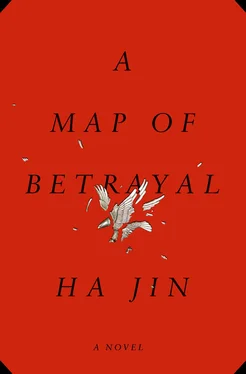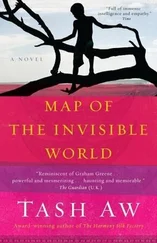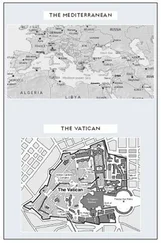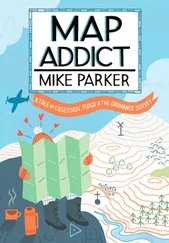“But he married your mother and kept a mistress on the side,” Ben said, an edge to his voice.
“He was a complicated man. He might have been traumatized.”
“By what?”
“By the separation from his original family. Imagine how much he carried within him. In the beginning it must have been so hard for him. Then gradually he grew jaded and numbed. Still, he was human and couldn’t possibly have suppressed his longings and pain all the time. The more I work on his story, the more terrible his life appears to me.”
Ben lifted his cup of coffee and took a large sip. He went on, “Was he a good father to you?”
“Absolutely. He was gentle and loving and patient. I must have been the only person on earth he could hold close to his heart, but I went to a prep school when I was thirteen and then to college. I didn’t spend enough time with him. He once told me that someday he and I would go visit his home village together. If only we could have done that.”
“He never saw his son, my uncle, who died at the age of twelve. A couple of articles say Gary was a bigwig in China’s intelligence service. Was he that big?”
“According to his diary, he was a vice minister of national security, holding the rank of major general.”
“I can’t believe this! My uncle starved to death while his father was a high official.”
“I was told he had died of encephalitis.”
“That was what the local clinic said. Some people also said he’d died of a twisted gut. But my grandmother told me he had actually starved to death, his belly sticking out like a balloon. During the famine the family had to eat wild herbs, elm bark, willow leaves, corncob flour, and whatnot. My uncle wasn’t strong physically, but he was hungry all the time, shrunken to the bone. Once he was ill, there was no way his body could fight the illness.”
“Your grandfather didn’t get the big promotion until 1972, long after the famine.”
“Still, we didn’t benefit one bit from his high rank. My grandmother was terrified by the rumor flying around their hometown. It said that her husband had fled to Taiwan and then to the U.S. Some people even threatened to denounce her publicly and drag her through the streets. The true reason was, they were jealous of the money she received from the government every month. In the 1950s, a hundred yuan was a tidy sum. Grandma had no choice but to cut all the ties to her husband to protect the family. After she left Shandong, she didn’t report her whereabouts to the government and stopped receiving his salary on purpose. She was too scared to be connected with him publicly. So the family had to start from scratch in a mud hole of a village and constantly struggled to make ends meet. My mom did all sorts of work in her teens, even collected manure and dug up sand to sell to a construction company. She also cut grass for a pig farm, and during the winter she sold frozen tofu in the county town, having to set off before daylight. After she and Dad got married, they both toiled in the fields like beasts of burden for many years. My dad almost got killed in a granite quarry, unable to work for months after an injury to his leg. Our family always lived hand to mouth until he became a clerk in the county administration.”
“Would it be possible he got that job because of some official help?” I doubted that the government was really ignorant of where Yufeng was. It seemed to me that very few people could escape its surveillance.
“I doubt it,” Ben said. “Before working in that office, Dad had taught elementary school briefly. He could write well, and the county administration needed someone like him for propaganda work. For many years nobody in our family would mention my grandfather, not until the mid-nineties, when we were informed that he had died in the line of duty overseas. In other words, officially our family had a clean history. When Grandma heard about that, she wept for a whole night.”
I burst out, “The government ought to have paid her all the arrears — I mean Gary’s salary had been accumulating since 1961.”
“They did when she filed a petition. That’s how our family got the funds for starting the seamstress shop.”
I didn’t know what to say and lowered my eyes, which were getting hot and watery. Unlike them, I was the main beneficiary of my father’s small amount of wealth, which Nellie inherited and later bequeathed to me. (They’d been co-owners of the house.) Reluctant to let on to Ben that my mother had given me the down payment for our apartment building, I remained silent.
Ben continued, “Aunt Lilian, do you think my grandfather loved China to the end of his life?”
“I believe so. Otherwise it would have been unimaginable for him to live that kind of isolated existence for so many years while he was always determined to return to his homeland.”
“He sacrificed a great deal for China, in other words. I respect that, but in his trial he claimed he loved America as well.”
“That must have been also true. He had lived here for so many years that he couldn’t help but develop some good feelings for this place. Besides, my mother and I were Americans.”
“Truth be told, that’s what I fear most.”
“Fear what?”
“To love both places and be torn between them.”
“Is that why you can’t make up your mind about marrying Sonya and settling down here?”
“In some ways. Yes.”
He didn’t say more about his plight. I knew he was to some extent controlled by his company in China. In the back of my mind remained the suspicion that Ben might have been collecting intelligence for the Chinese military, though I wasn’t sure how professional he was. I guessed he might be a petty spy specializing in industrial and technological information. Regardless, it was a dangerous business and he might get caught sooner or later.
He stayed with us for only one day and took the Acela Express back to Boston the next morning. I had let him take all six volumes of Gary’s diary with him in the hope that they might shed some light on his investigation.
I urged my husband not to purchase microchips for Ben again. “What’s the big deal?” Henry asked blithely.
“The chips are banned from export to China,” I said. “And some Chinese companies might be their destinations.”
“That’s Ben’s business. Mine is just to buy them.”
“But that might make you an accomplice.”
“Don’t be such a worrywart, Lilian. I do everything legally, and I have no further connection with the chips once Ben has them. How the hell can I be charged for buying something entirely legal on the market? The truth is anybody can get them — if not from the U.S., you can buy them from places like Taiwan and Singapore.”
“This gives me the willies.”
“Sweetie, just take it easy. At this rate I’ll pay off my debt and get rich pretty soon.”
So I left it at that, but still I was agitated.
Twice a year Gary would pass a batch of films to Father Murray, and for every delivery a thousand dollars would be deposited into his bank account in Hong Kong. But he wouldn’t withdraw cash directly from it, afraid of being noticed by the FBI. Since 1976, when the Cultural Revolution officially ended, he’d written to Bingwen regularly, addressing him as his cousin, as before. He asked him about Yufeng and their children, and the man would assure him that everything was fine back home. Bingwen also repeated the instruction that Gary must not attempt to contact his family in China again. That was unnecessary — he’d finally been informed that Yufeng had left their home village to join her brother’s village in the northeast, and Gary couldn’t possibly find out her current address.
Читать дальше











